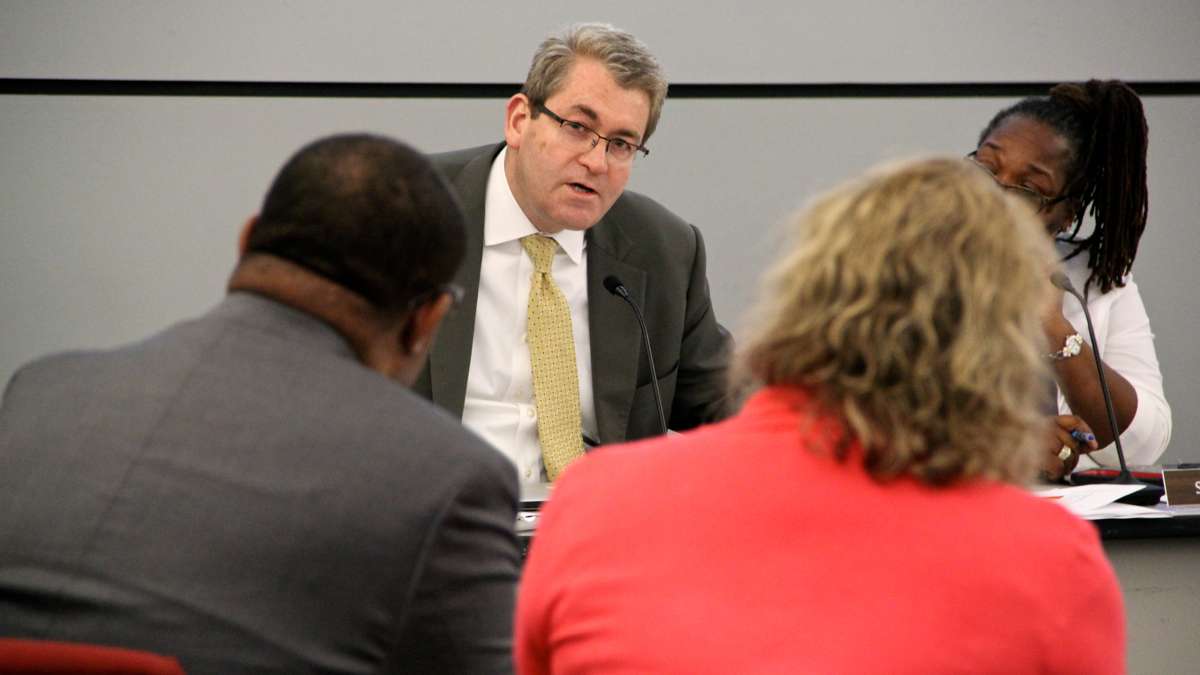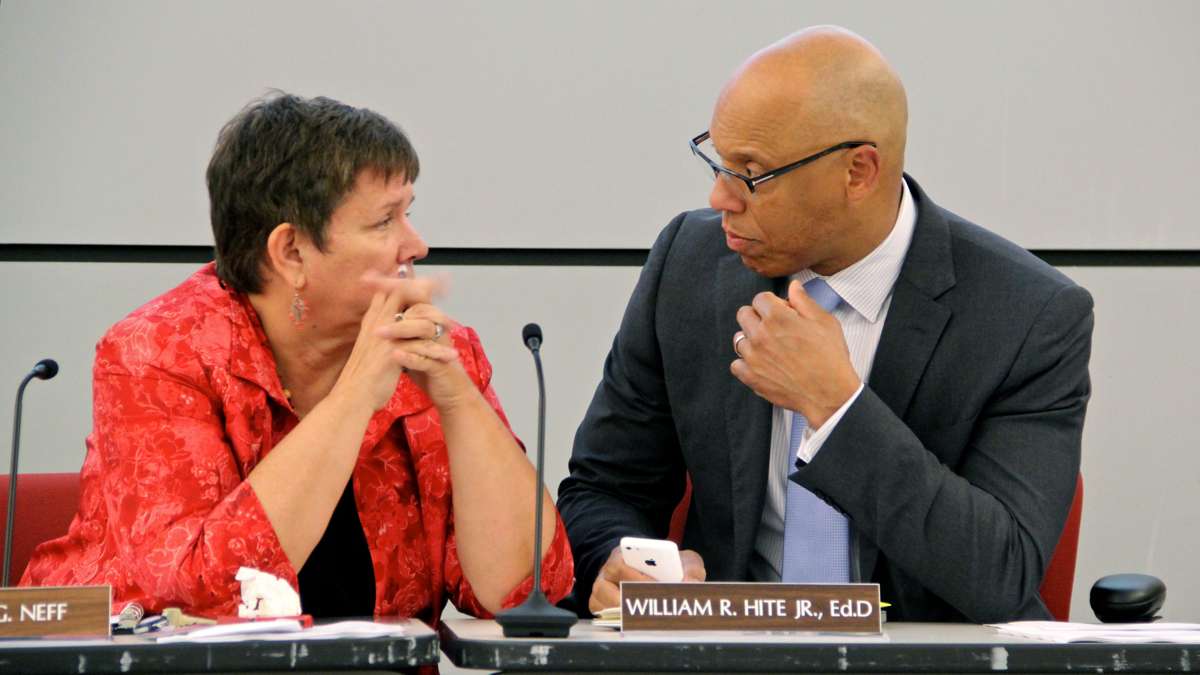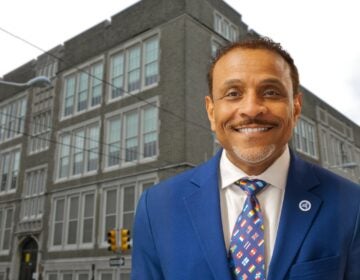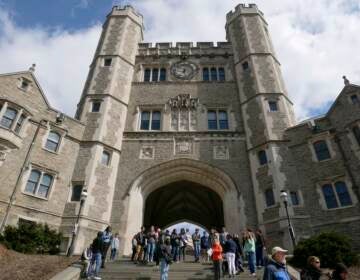‘We needed a turnaround in a turnaround’: SRC votes not to renew first Renaissance charter
The Philadelphia School Reform Commission voted not to renew two charter schools, including for the first time, one of its own hand-picked Renaissance charters Monday night.
Delaware Valley Charter High School (DVCHS) and Universal Bluford both received notices of nonrenewal.
DVCHS’ CEO Ernest Holiday pushed back on the numbers gathered as a part of the charter school office’s evaluation process, including math proficiency of less than 30 percent for the past three years.
“The recommendation does not adequately reflect our 2013-2014 graduation rate,” said Holiday, who put the graduation rate for that year higher than 98 percent.
Holiday and commissioner Bill Green also debated that school’s $190,000 debt to the district which, according to the district’s charter school office, DVCHS accrued by continually overbilling.
Ten other schools had their charters renewed: Folk Arts Cultural Treasures Charter School, Independence Charter School, Mastery Charter High School, Mastery Charter School Harrity Elementary School, Mastery Charter School Mann Elementary School, Mastery Charter School Smedley Elementary School, Mastery Charter School Thomas Campus, Northwood Academy Charter School, People for People Charter School and Universal Daroff Charter School.
Two other schools — MaST Community Charter and Imhotep Institute Charter High School — received belated renewal notices after a back and forth about renewal terms.
In the long and hairy charter authorizing process, Universal Bluford’s nonrenewal is a test case for Renaissance charters.
“We needed a turnaround in a turnaround”
Unlike a standalone charter school, a Renaissance charter takes an existing public school and turns over the administration of the school to a district-selected charter operator. The hope, via the school district’s website, is to bring about “dramatic improvement in student achievement” through the change in a school’s administration.
The vote to not renew one of these Renaissance charters poses the question: what if that improvement isn’t dramatic enough?
SRC commissioner Feather Houstoun drew out this point in the public discussion around the non-renewal of Universal-Bluford. “I was struck with the notion that we needed a turnaround in a turnaround.”
According to that school’s administrators, they are committed to academic growth and they’ve put in measures to ensure less tangible parts of school performance already.
“We address many of the realities that challenge today’s schools and educators,” said Universal’s Senior Executive Vice President of Education and former school district administrator, Dr. Penny Nixon. “Cultural Disconnects, disengaged students, poverty, too much unstructured time, violence and unsafe schools,” she said are just some of what the school is trying to address.
She also touted the school’s “community model,” which provides medical services to kids and supports to parents, like financial counseling. But Nixon and others cited principal turnover, three in five years, as one thing holding the school back in terms of school performance
Ultimately, climate is not the school district’s mandate, but academic outcomes are. The district voted not to renew Universal-Bluford and Delaware Valley Charter High School for not meeting their academic targets.
Two other Renaissance charters — ASPIRA’s Stetson Charter and Young Scholars Frederick Douglass — may come up for a non-renewal later this month, as reported by The Public School Notebook.
Nonrenewal process
This SRC vote is just one step in a multi-tiered process of public input and back-and-forth with charter operators that goes into closing an under-performing charter.
Most charters are issued for five years. At the end of a school’s five year charter, the district’s charter school office evaluates the charter’s performance and makes its recommendation to the SRC as to whether that charter should be renewed, or not.
The first Renaissance charters opened in Philadelphia in 2010, so this is the first year that they’re up for a renewal vote.
After this step, the SRC votes on the charter school office’s recommendations. After the vote, the District holds a public hearing on a decision to not renew or revoke a charter. Following the hearing, a 30-day window for public comment opens.
At the end of the public comment period, a hearing officer makes a recommendation and the SRC votes again.
At this point, a charter operator can make its case for staying open to the state’s Charter Appeals Board (CAB).
According to Lauren Iannuccilli from the district’s charter school office, the process for closing down a Renaissance charter is the same as for conventional charters.
If a Renaissance chooses not to appeal by the next school year, then “we would seek a new operator or at the very least ensure that the school operate next year” under a district-led team, said Iannuccilli.
During the Universal Bluford proceedings, SRC members were careful to spell out that the initial non-renewal vote was not the end of the road for that turnaround school. They could choose to appeal and work to improve outcomes during that process.
As for DVCHS, Holiday said he hopes parents will hang tight during the appeals process, which allows the school to continue operations while fighting in court. “We feel we will be vindicated once we get our day in court.”
Ten renewed, but with conditions
In addition to given notices of nonrenewal to two schools, the SRC voted to renew 10 schools with conditions.
According to Iannuccelli, charter schools heading into the renewal process should expect to be told they must “backfill,” or fill empty seats mid-year, if they don’t already.
“If the idea is that charters are in demand, then they should be pulling from their waitlists,” said Iannuccilli.
Some charters prefer not to backfill, as taking new students at any point, as the school district does, can be disruptive.
Other conditions for renewal handed to several schools included more resources and certified teachers working with English-Language Learner (ELL) and special education students, as well as more transparency in the functioning of their boards.
The next round of charter renewal votes comes during the May 21st SRC meeting.
WHYY is your source for fact-based, in-depth journalism and information. As a nonprofit organization, we rely on financial support from readers like you. Please give today.








